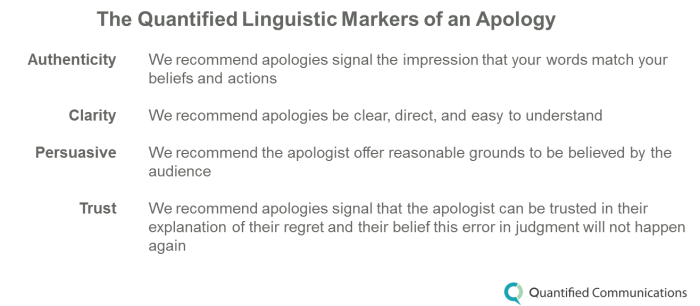Crafting Persuasive Apologies: Lessons from Brian Williams

A Veteran’s Perspective on How to Deliver a Persuasive Apology
NBC news anchor Brian Williams has faced a backlash since issuing his apologies for misstating the facts of his experiences in the Iraq War. Much of this backlash has come from my fellow veterans who believe being shot at is a rite of passage too significant to be infringed. I decided to use our communication analytics technology, built on state-of-the-art communications research, data science technology, and audience testing, to objectively analyze Mr. Williams’ apology to identify any triggers in the language he used that may have contributed to this backlash.
The components of an apology
Leadership expert Barbara Kellerman, writing in the Harvard Business Review, identifies the key components of an apology as:
- Acknowledging the mistake or wrongdoing
- Accepting responsibility
- Expressing regret
- Providing assurance that the offense won’t be repeated
But what about the language used when someone delivers an apology? How can someone apologize in a way that is deemed to be genuine and sincere?
The Quantified Linguistic Markers of an Apology
Based on our research, we have identified the four most critical linguistic patterns needed to ensure an apology is considered genuine.
Measuring Mr. Williams’ Apology
Using this linguistic framework, we used natural language processing to analyze Mr. Williams’ apology. We benchmarked the authenticity, clarity, persuasiveness and trustworthiness of his apology against similar content in order to provide a contextual 0 – 100 measurement. Here is what we found:
In three of the four most critical linguistic markers of an apology, Mr. Williams scored within the top 4% percentile compared to speakers of similar content. This suggests he was clearly communicating with authentic and trustworthy language.
However, the Persuasion score of 50.6% suggests Mr. Williams’ apology may not have fully convinced the audience that his regret was sincere. So how could this apology have been more persuasive?
The Impact of Emotional Appeal in an Apology
One of the most effective ways to persuade an audience is to appeal directly to their emotions. In fact, emotional appeals are considered one of the three key modes of persuasive communication, and they and are particularly important in an apology.
Often when an apology is needed, the apologist has rattled the emotional stability of people who have trusted him. In this case, Brian Williams’ regular Nightly News audience trusted him to present facts truthfully and therefore likely felt the emotions associated with betrayal. His military audience may have felt emotions associated with anger, distrust and frustration as Mr. Williams acknowledged the experiences he had described were not his own to share.
Brian Williams could have been more effective in his apology not only by acknowledging that he had betrayed this trust but also by formally recognizing and speaking to the emotions his audiences likely felt as a result of that betrayal.
As an Army veteran of the Iraq War, I understand how the fog of war can impact one’s situational awareness and how the adrenaline associated with combat can understandably distort one’s perceptions. Further, Brian Williams has cultivated a well-deserved reputation as a journalist and as a world-class professional communicator. However, Mr. Williams is less experienced—and less effective—at the art of apologies. By incorporating greater emotional appeal, apologies can be more persuasive, more likely to be perceived as sincere, and more likely to be accepted.

